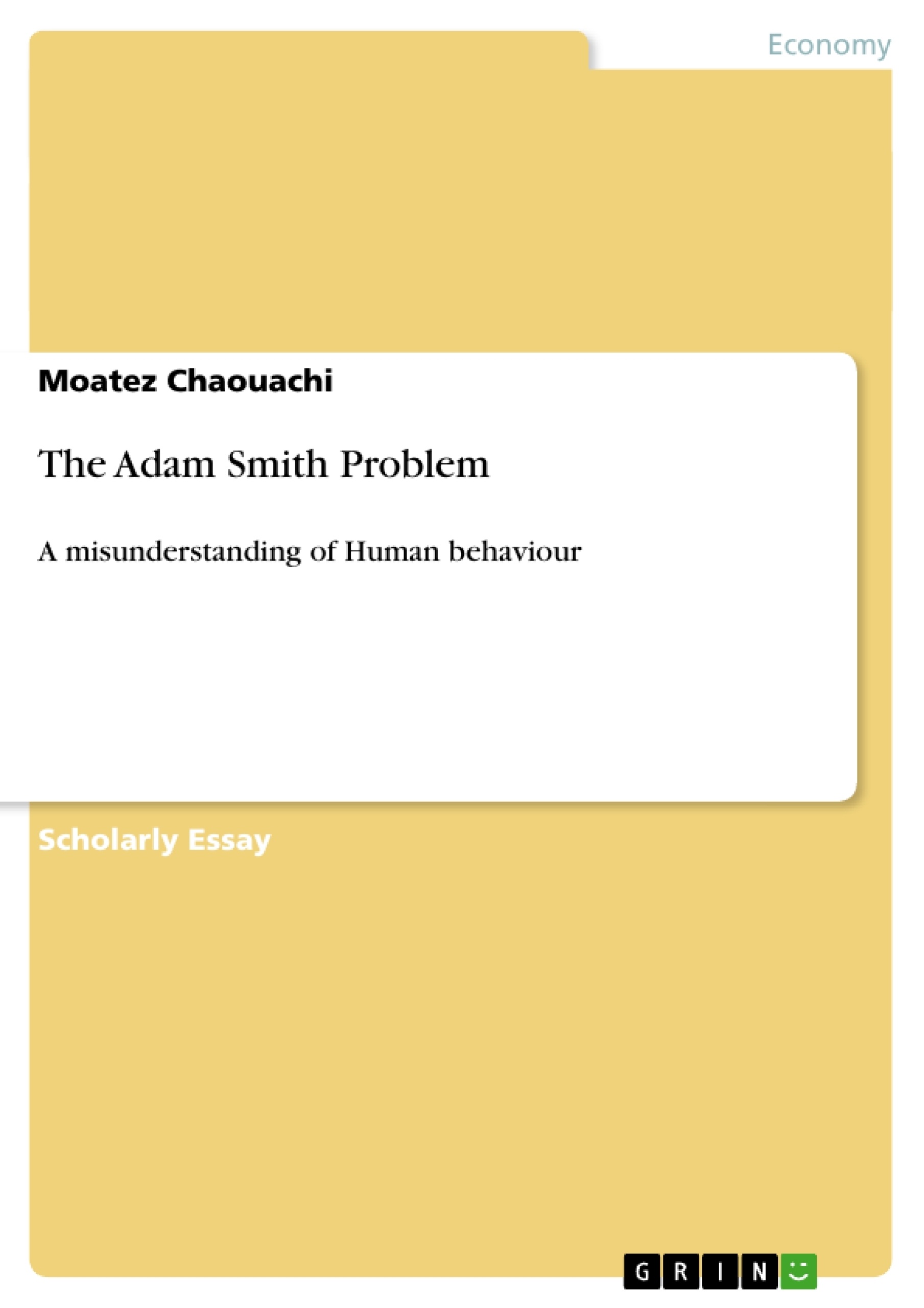Excerpt
Introduction
The concepts presented in Adam Smith’s Theory of Moral Sentiments and Wealth of Nations have become a subject of debate for many decades. The moral philosophical principles contained in these two works are considered by some economic pundits as contradictory. This has become the basis of Adam Smith Problem. In Wealth of Nations , Smith vehemently cited that economic practices were motivated by the principle of self-interest. On the other hand, Smith argued that economic behaviour was mainly determined by sympathy, a sentimental phenomenon that is prominent in the Theory of Moral Sentiments . As such, these two works present a moral dilemma as to whether the human behaviour in economy is motivated by self- interests or sympathy (Wilson and Dixon, 2006, p.251). In effect, the Adam Smith Problem revolves around the presumption that economic behaviour is driven by both social interest of benevolence and private interest of self-love. This paper presents a critical analysis of this problem. In details, the paper seeks to determine the extent to which the problem is based on a misunderstanding of human behaviour.
The problem that generates from Smith’s seemingly contradictory behavioural principles can be largely considered to be a misunderstanding of human behaviour (Wilson and Dixon, 2006, p.255). In effect, some theorists such as Montes offer suggestions that clearly depict coherence between Wealth of Nations ’ self-love and Theory of Moral Sentiments ’ sympathy and passion. The sympathetic process can be labelled as a guiding path for self-interest (Asharaf, Camerer and Loewenstein, 2005, p.142). Sympathy, just like self-love, can be termed as a disposition that is naturally inherent in human beings.
However, an insight into Smith’s sympathy and self-interest notions reveals that human behaviour is exceedingly accommodative of contrasting characters (Keppler and Chase, 2010, p.43). Smith argued that people are naturally inclined towards pursuit of their own achievements and successes. On the same note, Smith believed that such pursuance of self-interests cannot bar an individual from being endowed with sympathetic feelings towards other people (Wilson and Dixon, 2006, p.256). As such, it can be deduced that Adam Smith Problem is purely a misunderstanding of human behaviour.
It is undeniable that the Wealth of Nations advocates for mercantilism in the market environment (Herbener, 1987, p.279). This concept is based on self-interest and notable capitalism. On the other hand, the Theory of Moral Sentiments advocates for afforded assistance (Wilson and Dixon, 2006, p.256). In the mercenary exchange, people negotiate on prices and terms of trade to come up with agreeable conditions of the subsequent transaction. In its very basic form, the mercenary exchange is based on personal interests. However, during the negotiation process, each party offers the other some considerable reciprocal assistance (Herbener, 1987, p.279). The process involves role switching, which is tantamount to creation of coincidence of sentiments.
Despite the fact that individuals in a business transaction are driven by self-interests as cited in Wealth of Nations , the negotiation process enables each of the parties to develop voluntary cooperation of the other (Herbener, 1987, p.279). This is a natural process that is guided by human behaviour, rather than a construct of rules of conduct. The system of interaction in a market environment moderates sentiments which are considered as foundations of social setting in the Theory of Moral Sentiments . The relative incompatibility of self-interest and sympathy, which forms the basis of the Adam Smith Problem, ultimately dissolves during the negotiation process (Wilson and Dixon, 2006, p.257). These are natural depictions and the reality of human behaviour. Therefore, the structure of Adam Smith Problem depicts a misunderstanding of human behaviour.
One of the theorists who attempt to show the extent to which Adam Smith Problem is a misunderstanding of human behaviour is Chalmers. The human self, as depicted in the Wealth of Nations can effectively coexist with the moral sentiments of the Theory of Moral Sentiments (Wilson and Dixon, 2012, p.57). There is no significant contradiction between the two forms of human nature. To Chalmers, similar to Smith in way of thinking, self-interest does not necessarily preclude the development of affection towards others. Individuals who are motivated by self-love cannot independently act without developing a sense of reaction to other individuals (Wilson and Dixon, 2012, p.57).
This amounts to sympathy, which is comparable to moral sentiments. In human behaviour, as Chalmers believes, intrinsic learning (element of self-interest) is established through taking into consideration the feelings and profound needs of others (element of sympathy) (Keppler and Chase, 2010, p.43). Thus, coexistence of these two behavioural aspects is clearly a natural phenomenon of human behaviour. Chalmers embraces the notion that human act, regardless of the motive, is always moral to the core (Wilson and Dixon, 2012, p.57). This is because human acts inherently incorporate the sense of expectation from other people’s views.
It is from this behavioural conception that liberal economies are established. The arrangements of a liberal economic and political platform, from Smith’s perspective, depend on the sustainability of self act, rather than the motive of the action (Wilson and Dixon, 2012, p.57). The prevalent affinities between individuals help in harmonising self-interests and social interests (Asharaf, Camerer and Loewenstein, 2005, p.133). Thus, the criticism of Adam Smith’s concepts of sympathy and self-interest as elements of an economic problem is based on a misunderstanding of human nature, from Chalmers perspective.
[...]
- Quote paper
- Moatez Chaouachi (Author), 2012, The Adam Smith Problem, Munich, GRIN Verlag, https://www.grin.com/document/197628
Publish now - it's free






















Comments